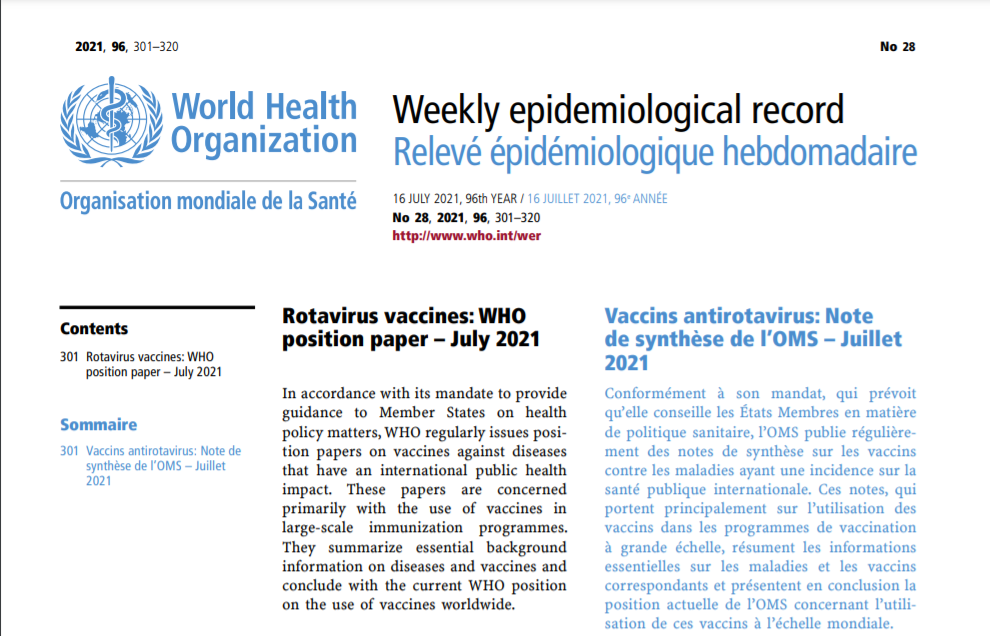
WHO re-emphasizes importance of rotavirus vaccination in new position paper

On Friday, July 16, 2021, the World Health Organization (WHO) released its first updated rotavirus vaccine position paper since 2013. WHO’s position papers summarize all currently known research relevant to a vaccination against a certain pathogen and provide formal recommendations. In the eight years since the last rotavirus vaccine position paper was released, a lot has changed. The number of countries using rotavirus vaccines in their national immunization program has more than doubled, from 43 to more than 110, and two more rotavirus vaccines, ROTAVAC® and ROTASIIL®, have been licensed and WHO-prequalified. Research has provided additional insight on the impact of the vaccines—including the estimated 40% global reduction in rotavirus prevalence following the introduction of rotavirus vaccines—the duration of their protection, and the cost-effectiveness of rotavirus vaccination programs.
Overall, the main recommendation remains the same as it has since 2009: rotavirus vaccines should be included in all national immunization programs and considered a priority, particularly in high-mortality countries. A selection of the other recommendations from the 2021 WHO rotavirus vaccine position are summarized here.
Role of rotavirus vaccines among other preventive measures
WHO still emphasizes the importance of a comprehensive, integrated approach to diarrheal disease control in line with the WHO/UNICEF Global Action Plan for Pneumonia and Diarrhoea (GAPPD). The position paper states:
“The use of rotavirus vaccines should be part of a comprehensive strategy to control diarrhoeal diseases with the scaling up of both prevention (promotion of early and exclusive breastfeeding, handwashing, improved water supply, and sanitation) and treatment packages (low osmolarity ORS and zinc). WHO emphasizes the importance of integration of immunization services with other health interventions throughout the life course to help maximize each interaction with a family.”
“The use of rotavirus vaccines should be part of a comprehensive strategy to control diarrhoeal diseases.” – World Health Organization, 2021 rotavirus vaccine position paper
Product choice
All WHO-prequalified rotavirus vaccines, including ROTARIX, RotaTeq, ROTAVAC, ROTASIIL, and ROTASIIL-Liquid, are safe and effective. WHO offers this guidance for how countries should select which vaccine to use:
“The choice of product to be used in a country should be based on programmatic characteristics, vaccine supply, and vaccine price. Current evidence indicates that local data on circulating rotavirus strains should not drive product choice, as the WHO prequalified rotavirus vaccines provide protection against heterologous strains.”
Interchangeability
Because of the availability of multiple rotavirus vaccine products, many countries may wonder whether two or more products could be interchanged. WHO maintains this recommendation:
“The rotavirus vaccination series for each child should be completed with the same product whenever feasible. However, if the product used for a prior dose is unavailable or unknown, the series should be completed with any available licensed product.”
Additionally, the availability of new products has led several countries to undergo or consider a switch from one rotavirus vaccine product to another. The paper provides this guidance:
“If a country is switching from one vaccine product to another, the primary emphasis during the transition period should be to complete the vaccination series with the same rotavirus vaccine product for each individual child. When this is not feasible due to programmatic difficulties, children who have an incomplete series should complete the series with a different product.”
Vaccine safety
The safety recommendations remain the same, as additional research has confirmed that prequalified rotavirus vaccines are safe and that the benefits outweigh any small, potential risks of intussusception.
“WHO-prequalified rotavirus vaccines are safe and well tolerated. As with any vaccine introduction, proper planning and training of staff to conduct pharmacovigilance should take place before the vaccine is introduced. Countries should develop a strategy to inform relevant health staff that although the benefits outweigh the risks, a small potential risk of intussusception after rotavirus vaccination remains.”
“WHO-prequalified rotavirus vaccines are safe and well tolerated.” – World Health Organization, 2021 rotavirus position paper
Surveillance
WHO recommends that the effectiveness and safety of rotavirus vaccines should be monitored post-introduction, particularly for ROTAVAC and ROTASIIL due to the limited amount of post-licensure safety data available for these newer vaccines. However, surveillance is not a necessary precondition for rotavirus vaccine introduction:
“High quality surveillance should be conducted in selected countries and defined populations, including high-mortality settings. However, lack of such surveillance should not be an impediment to rotavirus vaccine introduction.”
Research priorities
Finally, the position paper reviews current research priorities, which include investigation of neonatal vaccination schedules and booster doses as well as the continued development of alternative formulations of rotavirus vaccines.
As science continues to advance our knowledge of rotavirus vaccine effectiveness, impact, and costs, countries continue to make decisions about introduction. Every rotavirus vaccine introduction saves lives and precious health resources, which are crucial to preserve amid the COVID-19 pandemic. Given the proven safety, efficacy, and real-world impact of all prequalified rotavirus vaccines, WHO recommends all countries worldwide introduce rotavirus vaccination programs.
Note: If your country is considering a rotavirus vaccine introduction and/or has questions about rotavirus vaccine costs, products, or switches, visit PATH’s Rotavirus Vaccine Cost Calculator or contact PATH’s Health Economics and Outcomes Research (HEOR) team at HEOR@path.org.


